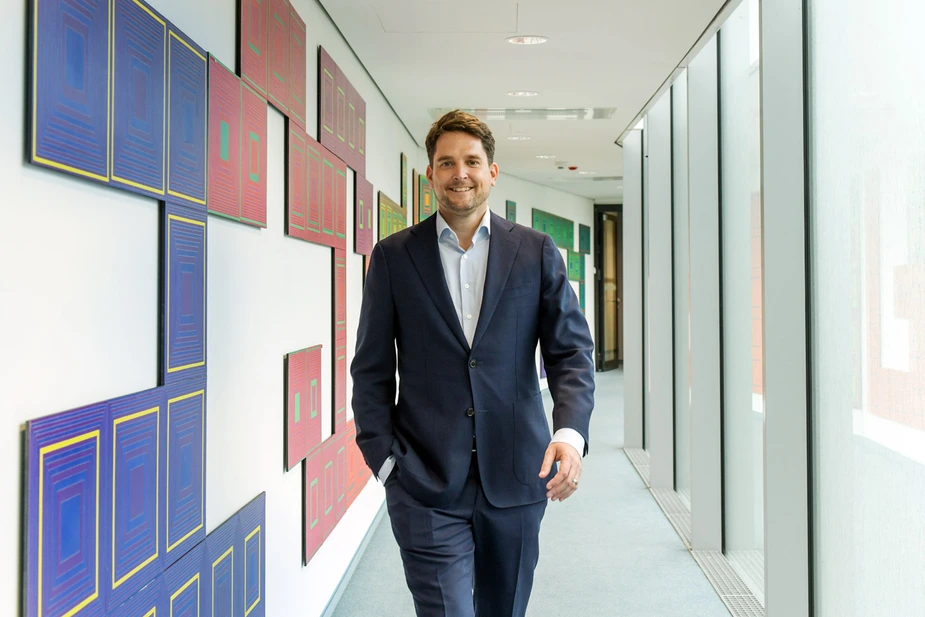All new at Allianz: From financial technologies to working from home
The insurance company’s new building is at the forefront of implementing new ideas for a modern working environment
The moment finally arrived on 20 September: the new Allianz Campus in Berlin, which has been under construction near Adlershof’s S-Bahn station since 2016, saw its official opening. As early as May, months before the official opening, the move of Allianz had already brought 2,500 new employees to Adlershof. The new staff works in sales, claims settlement, and operations, which also organises and processes contract management. The new building is also home to the nationwide logistics service centre, where the entire company’s flow of written information is distributed – amounting to 31 million postal and electronic items every year – manually and mechanically, day and night.
‘Berlin still is an important location for us as Europe’s largest insurance provider,’ says Tobias Haasen, the head of the branch, ‘despite our headquarters’ post-war move to Munich after the city was divided.’ The company was founded in Berlin, almost 130 years ago, in 1890. Berlin’s two branches were merged in 1998 and moved into a new stately headquarters in the Treptowers, a prestigious high-rise office building. ‘This was a very conscious move to support the East German economy,’ says Haasen. When the Treptowers building complex was sold, the company continued renting offices until the contract expired in 2019. Prospective increases in rent, on the one hand, and the desire to explore novel office concepts that were incompatible with the old building’s structure, on the other, prompted the company to look for a new location.
Adlershof beckoned with a free plot of land directly next to the S-Bahn station, in the same district, close to the airport, and with a developed infrastructure, including shopping, dining, medical services, and day nurseries. On top, as the tenant for the next 15 years, the company got the opportunity to shape the building according to its needs.
From the outside, the four-storey building with its overlapping structure and curved façade is interesting but subtle. The building’s distinct intricacy is only visible when viewed from the top: 60,000 square metres of usable space are distributed across many interconnected parts of the building. The advantage is that countless windows let daylight into the offices.
The new building made it possible to adjust the floor plan according to the many aspects of Allianz’s new office concept. First, this involved creating open office spaces to facilitate better communication. However, these are not classic open plan offices but so-called ‘open spaces,’ which contain many four-people compartments that are soundproofed with textile elements. Employees seek out a new desk every morning to match their activities of the day. The office also provides meeting rooms for working in teams and retreat spaces, which include a parents’ room for when employees bring their children to work.
A large canteen on the ground floor and kitchens on all other floors add to the staff’s well-being. Many offices have showers that cyclists can use after their commute. They can store their bikes at one of the 200 available secure bike parking spaces. A car parking garage with 500 parking spots and 20 charging stations for electric cars, which are not being used much yet, according to Haasen, are available for those using their car despite the conveniently close S-Bahn station. The building received certification for sustainable design. It has rainwater toilets and ceiling cooling instead of an AC, which has already stood the test during the first hot months after moving in. The staff is also embracing the opportunity to work from home twice a week. About 80 percent of eligible staff are doing it.
‘Being so close to science and research and the tech scene was also relevant to our decision to move here,’ says Haasen. ‘We are already in close contact with Humboldt-Universität zu Berlin. We believe that academia and the research community are important for identifying future trends.’
Allianz is already cooperating with start-ups when developing app solutions for its products or working on issues like big data. However, not yet with start-ups from Adlershof. Haasen is very aware of the potential for future cooperation in fields like health prevention (demographics), autonomous vehicles (traffic), and digital transformation in general, for example, issues related to increasing working efficiency. Allianz has expressed an interest to quickly join the Health Forum Adlershof network and to participate with its staff in studies on working from home and its effects on sickness absence and productivity.
By Dr. Uta Deffke for Adlershof Journal
